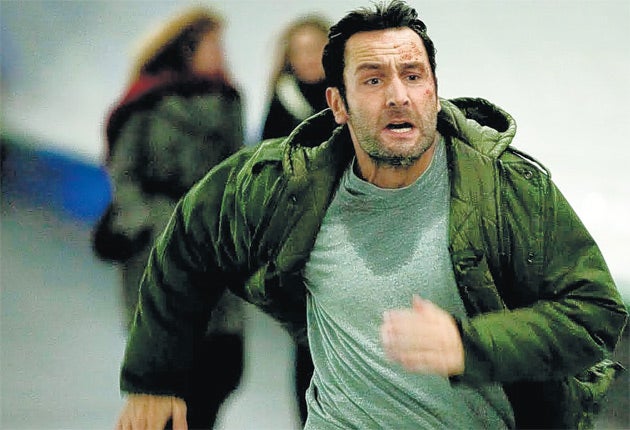Point Blank (15)
Starring: Gilles Lellouche, Elena Anaya, Gerars Lanvin

The French writer-director Fred Cavayé has got the right stuff. His debut feature, the thriller Anything for Her (2008), was about a man so convinced of his wife's innocence that he breaks her out of prison. Hollywood liked it enough to remake it almost immediately as The Next Three Days, with Russell Crowe playing the unassuming Pittsburgh academic who turns daredevil escape artist. Cavayé's second film, Point Blank, is not unlike his first in depicting an ordinary man who goes to desperate lengths – assaulting police officers, kidnapping felons, jumping in front of trains – in order to save his wife. The film-maker is perhaps intent on creating a mini-genre of his own: the uxorious chase thriller.
He treats both parts of his job title with equal seriousness. As writer (partnered here by Guillaume Lemans) he constructs twisted plots whose sometimes tenuous hold on plausibility is underpinned by his muscular work as director. Some thrillers take the softly-softly approach to generating tension. Not this one. Cavayé hits the ground running with a tremendous chase scene as a man, nursing a gut wound, is pursued through night-time Paris by two gunmen. They're just about to finish him off in a busy underpass when a speeding motorcyclist collides with their quarry and pitches him into the middle of next week. "Job done", think the assassins, and slope off into the dark.
But our fugitive is not dead after all, fetching up in a hospital surrounded by breathing apparatus and attended by a trainee nurse, Samuel (Gilles Lellouche), a personable guy whose wife is pregnant with their first child. The police are called in after Samuel foils a murder attempt on the stricken fugitive, who turns out to be a notorious safecracker named Sartet (Roschdy Zem). Samuel, the have-a-go-hero, gets a ticking-off from his snitty superior, of course, because his priority should have been consulting the doctor before saving the patient (and we thought our health service was in bad shape). If only that was an end of it; instead, Samuel gets coldcocked in his flat by a mystery assailant, then wakes up to find his wife Nadia (Elen Anaya) has been kidnapped. The blackmail message comes through loud and mean – get Sartet (now under police guard) out of that hospital, or his pregnant missus dies.
Well, anything for her, as the Cavayé hero would say, and this time it's only a hospital to be escaped rather than a high-security prison. All the same, it's a tough one to crack, and the upshot is that Samuel gets on the wrong side of a police conspiracy involving the murder of a well-known plutocrat – and his wife is now hostage to a different set of goons. On the old "my-enemy's-enemy" reasoning, he makes a reluctant partnership with Sartet, the original target of the bad-apple cops who used him on a job and then intended to bump him off. This is where Cavayé's strong direction comes into its own, for however often the plot bends under the weight of unlikeliness it never breaks: momentum is always on its side. As is style, in long pursuits down stairwells, across buildings and eventually through Le Metro, with the breathless Samuel giving even Jason Bourne some competition for leaping, sprinting and vanishing in tight spaces. Gilles Lellouche, playing Samuel, doesn't look a natural action man, but there's nothing forced or false about his panicked expression as he skitters down an escalator, knocking outraged commuters aside.
That Metro scene, by the way, with a thuggish skinhead terrorising the hero, stirred agreeable memories of another French thriller I haven't seen in 25 years or more. At first I thought it was mere fancy on my part; then, in a follow-up scene, Samuel enters a room in which the famous aria "Ebben? Ne andrò Lontana" from La Wally is playing – the same one that featured in the moody 1980s classic Diva. Whether this is Cavayé's deliberate nod is difficult to say, but the link is there, and it made me want to check whether Diva is still a classic, or merely moody.
Point Blank also gets its casting spot-on, especially in the case of Roschdy Zem as Sartet, whose haunting, angular features made such an impression in Rachid Bouchareb's colonial Algeria dramas Days of Glory (2006) and Outside the Law (2010). He hardly says a thing while Samuel stitches his torn stomach wound, but he doesn't need to, so expressive is that saturnine gaze (you can tell from it that Sartet asks himself, perhaps more than once, whether he should kill Samuel and ease his own escape). There are two other great faces here, one Gerard Lanvin, the other Mireille Perrier, playing rival commanders on the force whose overlapping jurisdictions bring them into conflict: they both have that very French way of projecting vast reserves of style and steel. Their final encounter with each other has a genuine shock in store.
The film packs in so much one is surprised to learn that it runs for less than 90 minutes. Even during the somewhat incredible denouement at a chaotic police station, Alain Duplantier's camerawork is so frenetic you don't have time to stop and question it. As with Cavayé's first film, it's too entertaining to avoid being swallowed by Hollywood's giant maw and regurgitated as a remake. But why wait for a knock-off set in New York or LA when you can get the original right now, fresh as this morning's baguette?
Subscribe to Independent Premium to bookmark this article
Want to bookmark your favourite articles and stories to read or reference later? Start your Independent Premium subscription today.

Join our commenting forum
Join thought-provoking conversations, follow other Independent readers and see their replies